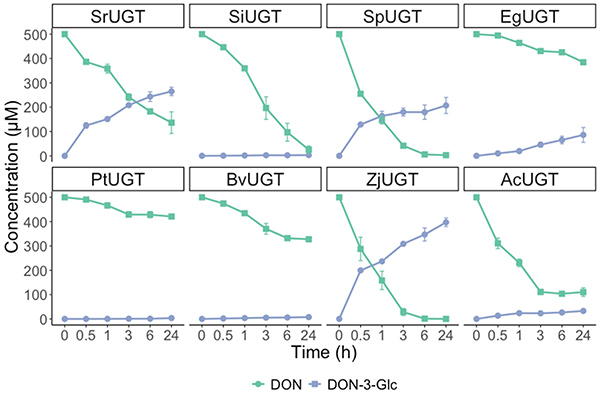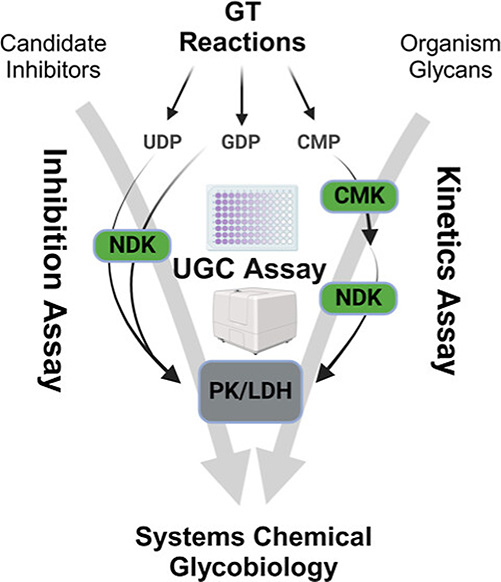Universal UDP-Glycosyltransferase Assay
Background
UDP-glycosyltransferases (UGTs) are a critical class of enzymes involved in the glycosylation of small molecules, including xenobiotics, hormones, drugs, and endogenous metabolites. As key regulators of molecular solubility, activity, and excretion, UGTs play essential roles in drug metabolism, plant secondary metabolism, and detoxification pathways.
Due to the broad substrate range and functional diversity of UGTs, developing a universal and scalable assay system is essential for accurately characterizing UGT activity and kinetics in both basic research and applied development contexts.

Figure 1. The reactions catalyzed by UDP-glycosyltransferases.
Advantages of Universal UDP-Glycosyltransferase Assay
| Simple, “mix and read” assay format |
A straightforward protocol requiring minimal preparation, enabling rapid and reliable results. |
| Far red fluorescence minimizes interference |
Utilizes far red fluorescence to reduce background noise and improve signal specificity. |
| Outstanding deck and signal stability |
Ensures consistent and stable signals throughout the assay duration, suitable for kinetic or endpoint measurements. |
| Compatible with any multimode plate reader |
Fully compatible with standard multimode plate readers, facilitating seamless integration into existing workflows. |
Creative BioMart offers a Universal UDP-Glycosyltransferase Assay service designed to provide a robust and high-throughput solution for UGT activity analysis. Utilizing a flexible assay platform that accommodates a variety of UDP-sugar donors and acceptor substrates, our service enables precise measurement of UGT enzymatic activity across different biological sources and conditions.
Our assay is suitable for:
- Functional screening of UGT isoforms
- Inhibitor and activator profiling
- Substrate specificity studies
- Drug metabolism and pharmacokinetics research
What We Offer?
Service Details
| Types | Details |
|---|---|
|
Assay Development & Customization |
|
|
Activity Screening |
|
|
Kinetic Studies |
Determination of Km, Vmax, and inhibition constants (Ki, IC50) |
|
Inhibitor/Activator Testing |
Evaluation of compounds for UGT modulation potential |
|
Metabolite Identification |
Structural confirmation of glycosylated products via MS/MS |
Service Delivery & Submission Guidelines
-
Sample Requirements
- Recombinant proteins, tissue lysates, or cell fractions
- Chemical compounds for acceptor substrate testing (optional)
- Detailed project scope and experimental goals
-
Deliverables
- Raw and processed assay data
- Detailed analytical report including enzyme kinetics
- Chromatograms or spectral data (where applicable)
- Expert interpretation and recommendations
Why Choose Us?
- Specialized Expertise: Extensive experience in glycosyltransferase biochemistry and enzymology.
- Custom Assay Design: Tailored solutions to meet unique substrate, enzyme, or detection requirements.
- Advanced Detection Platforms: State-of-the-art analytical instrumentation for high sensitivity and accuracy.
- Scalable Services: From single-sample studies to high-throughput screening campaigns.
- Data Confidentiality: Trusted by pharmaceutical, biotech, and academic clients globally.
- Comprehensive Substrate Library: Broad collection of nucleotide sugars and acceptor molecules to support diverse assay configurations and discovery needs.
Case Study
* NOTE: We prioritize confidentiality to safeguard our clients’ technology and intellectual property. As an alternative, we present selected published research articles as representative case studies. For details on the assay services and products used in these studies, please refer to the relevant sections of the cited literature.
Case 1: Discovery of novel plant UDP-glycosyltransferases enhancing resistance to Fusarium mycotoxin
Della Gala et al., 2025. doi:10.3390/toxins17040153
Fusarium graminearum threatens cereal crops by reducing yields and producing the harmful mycotoxin deoxynivalenol (DON). Plants detoxify DON via UDP-glycosyltransferases (UGTs) that conjugate glucose, forming DON-3-O-glucoside. Screening 380 recombinant plant UGTs revealed eight new enzymes capable of glycosylating DON in vitro, with ZjUGT from Ziziphus jujuba showing the highest catalytic efficiency. Several UGTs generated a novel glucoside variant. When expressed in DON-sensitive yeast, six UGTs conferred significant resistance. These findings offer promising avenues for improving DON resistance in crops.

Figure 2. Time-course glycosylation reaction of DON (0–24 h) catalyzed by the recombinant UGTs identified in the GLY-it screening, resulting in the formation of DON-3-Glc. (Della Gala et al., 2025)
Case 2: A universal continuous assay for accurate glycosyltransferase kinetics and inhibition analysis
Nashed and Naidoo, 2024. doi:10.1021/acsomega.4c00485
Chemical systems glycobiology requires robust tools for analyzing glycosyltransferase (GT) activity, but existing assays lack universality and precision across UDP, GDP, and CMP donor substrates. This study presents a universal glycosyltransferase continuous (UGC) assay that uses fluorescence to track NADH consumption, enabling accurate kinetic and inhibition measurements. The assay was validated on representative GTs (C1GALT1, FUT1, ST3GAL1) and demonstrated superior accuracy over endpoint methods. It also revealed time-dependent inhibition by soyasaponin1, highlighting the assay’s value for standardized GT analysis.

Figure 3. Graphic abstract for the study: universal glycosyltransferase continuous assay for uniform kinetics and inhibition database development and mechanistic studies illustrated on ST3GAL1, C1GALT1, and FUT1. (Nashed and Naidoo, 2024)
Customer Testimonials
-
“The universal UDP-glycosyltransferase assay from Creative BioMart drastically streamlined our enzymatic activity screening. Its simple mix-and-read format and excellent signal stability allowed our team to process large compound libraries with minimal troubleshooting.”
— R&D Director | Global Pharmaceutical Company
-
"We needed a robust, interference-resistant assay to validate glycosyltransferase inhibitors in complex biological samples. Creative BioMart's far red fluorescence technology provided clean data with minimal background, which significantly improved our confidence in hit identification.”
— Senior Scientist | Biotech Startup
-
“Integration with our existing multimode plate readers was seamless, enabling quick adoption without additional equipment costs. The assay’s consistent performance over extended kinetic studies supported our efforts in enzyme kinetics characterization.”
— Assay Development Manager | Contract Research Organization (CRO)
-
“This assay from Creative BioMart has become an essential tool in our natural product screening program. Its stability and sensitivity allowed us to detect subtle enzymatic differences between samples, helping prioritize leads for further development.”
— Principal Investigator | Academic Research Institute
-
"The technical support was exceptional. The Creative BioMart team helped us optimize the assay conditions for our unique substrates, and the resulting data quality exceeded our expectations, helping to accelerate our glycoengineering projects.”
— Senior Biochemist | Industrial Biotechnology Company
FAQs
-
Q: What types of UGTs can be analyzed in this assay?
A: We can work with human, animal, plant, or microbial UGT isoforms, using either client-supplied enzymes or our in-house recombinant expression systems. -
Q: What detection methods are available?
A: We offer HPLC, LC-MS/MS, fluorescence, and colorimetric detection, depending on substrate compatibility and sensitivity needs. -
Q: Can you assist with substrate synthesis or selection?
A: Yes, we can source or custom-synthesize both sugar donors and acceptor substrates as part of assay development. -
Q: How do I get started?
A: Contact us with your project details, including enzyme type, substrate(s), and desired readouts. Our scientific team will provide a customized service plan and quote.
Resources
Related Services
Related Products
References:
- Della Gala V, Dato L, Wiesenberger G, et al. Plant-derived UDP-glycosyltransferases for glycosylation-mediated detoxification of deoxynivalenol: enzyme discovery, characterization, and in vivo resistance assessment. Toxins. 2025;17(4):153. doi:10.3390/toxins17040153
- Nashed A, Naidoo KJ. Universal glycosyltransferase continuous assay for uniform kinetics and inhibition database development and mechanistic studies illustrated on ST3GAL1, C1GALT1, and FUT1. ACS Omega. Published online April 5, 2024:acsomega.4c00485. doi:10.1021/acsomega.4c00485
Contact us or send an email at for project quotations and more detailed information.
Quick Links
-

Papers’ PMID to Obtain Coupon
Submit Now -

Refer Friends & New Lab Start-up Promotions

